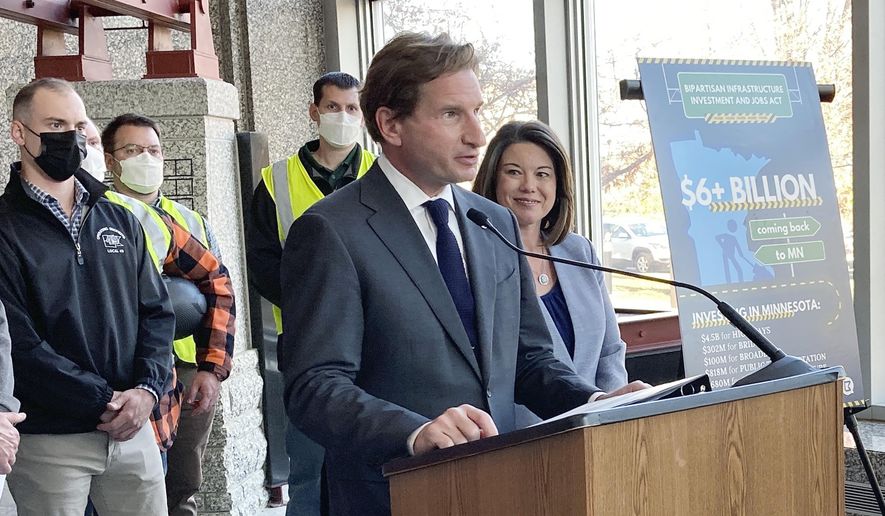Democrats are starting to acknowledge that even the best possible deal President Biden can strike with House Speaker Kevin McCarthy on the debt limit will present a loss for the party.
Democratic lawmakers on Capitol Hill expressed frustration that Republicans appeared to be in the driver’s seat. Republicans have rebuffed Mr. Biden’s push to close tax loopholes and expand Medicare’s ability to negotiate the price of prescription drugs, while forcing the White House to haggle over spending caps and welfare work requirements.
“This is not negotiation, this is extortion,” Rep. Alexandria Ocasio-Cortez, New York Democrat, said. “They are not open to any sort of counter on revenue raises … [Republicans] are just walking away.”
The view is not just sequestered to liberal firebrands like Mrs. Ocasio-Cortez. Rep. Dean Phillips, a member of the centrist and bipartisan Problem Solvers Caucus, bristled at the state of the negotiations.
“I’m deeply disappointed that [GOP spending cuts weren’t] immediately met with demands for revenue increases,” Mr. Phillips, Minnesota Democrat, said. “You’re negotiating against yourself if you’re not asking for something.”
Mr. Biden had initially refused to negotiate with House Republicans over raising the government’s $31.4 trillion debt limit. The White House kept the stance for months arguing that the national debt was incurred under both parties and there was a constitutional obligation to raise the borrowing cap.
It was a tactic the White House hoped would force the GOP to cave in and pass a clean debt limit hike or a truncated negotiation period would add pressure for Republicans to compromise. Neither scenario came to pass.
At least one Democratic lawmaker told The Washington Times that Mr. Biden was to blame for having waited so long to start negotiations.
“We’re the responsible party, we were never going to let the country default,” said the lawmaker, who asked not to be identified when criticizing Mr. Biden. “Yet, we waited to negotiate thinking the ticking clock would put pressure on Republicans to compromise, but they don’t care. Now this ticking time bomb has been turned back on us.”
Mr. McCarthy was able to unite Republicans behind the White House’s refusal to negotiate. Even vulnerable GOP lawmakers representing districts carried by Mr. Biden have balked at the demand for a clean debt limit hike.
The fast-approaching June 1 deadline to increase the limit or default on some U.S. obligations also failed to sway Mr. McCarthy, California Republican. He is insisting on getting as close as possible to the debt limit bill passed by GOP lawmakers last month.
The legislation cuts spending by $4.8 trillion over the next decade, while capping spending growth at 1% annually. It also cancels Mr. Biden’s student loan forgiveness plan, rescinds $200 billion in green energy tax credits, and imposes work requirements on food stamps, Medicaid, and cash payments.
“A simple way for the Democrats to avoid default is to pass the [bill] in the Senate,” Mr. McCarthy said. “Republicans remain the only ones in Washington who have actually done anything to lift the debt limit and avoid default.”
Given Mr. Biden’s long-held insistence on a clean debt limit hike, the GOP bill has served as an initial offer upon which the negotiators have tried to build compromise. Democrats say that is problematic because it means Mr. Biden is working to moderate what is inherently a conservative wish list.
“It is almost impossible to reconcile what we’re hearing about Biden pushing back with all of the other stuff we’re hearing that suggests the opposite,” Rep. Jared Huffman, California Democrat, said. “These are extreme, reckless demands [the GOP] has linked to a default.”
Mr. Biden’s allies note that the odds of winning a debt limit fight were always difficult. House Minority Leader Hakeem Jeffries said that if Mr. Biden secured an agreement on freezing spending this year that was a win given the circumstances.
“As part of the effort to find common ground, we’re willing to consider freezing spending,” Mr. Jeffries, New York Democrat, said. “That is not an extreme proposal. That is a reasonable proposal.”
House Republicans have rejected the offer saying that spending in the upcoming budget should be at least $130 billion less. They also want to cap federal spending growth at 1% for a decade. Democrats have offered two years’ worth of caps.
“A freeze is not less,” Mr. McCarthy said. “A freeze is spending the same amount.”
House Republicans’ demand for deep spending cuts is complicated by their desire to boost funding for border security, veterans and the Pentagon.
“Based on what Republicans have shown us with the appropriations bills, we are looking at a 30% cut across the board to the remaining domestic programs,” Rep. Pete Aguilar, California Democrat, said.
Mr. Biden and Republicans also are divided on expanding work requirements for able-bodied and childless adults.
House Republicans want such recipients of Medicaid, food stamps and cash assistance to work at least 20 hours per week. They also proposed blocking states and the federal government from waiving work requirements for food stamps.
Mr. Biden balked at new work requirements for food stamps and Medicaid but has shown openness to imposing them on recipients of cash payments. The Congressional Budget Office estimates that would only save $6 million through 2033.
• Haris Alic can be reached at halic@washingtontimes.com.




Please read our comment policy before commenting.